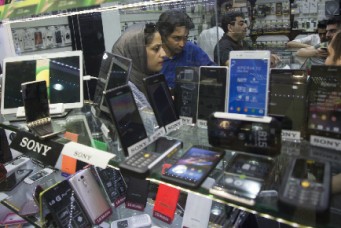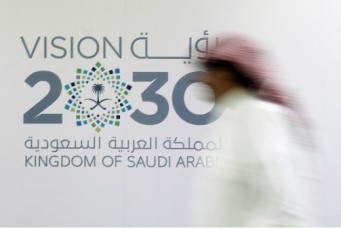Global Muslims in the Post-Osama Era
Best selling author and Mind/Body pundit Deepak Chopra has deemed him a “Muslim Gandhi” for his calls for a pacifist antidote to the often inaccurate Islamist extremist discourse that emerged post 9/11, and he has been widely sought in the American Media for his American- Muslim perspective. In his new book Islamic Pacifism: Global Muslims in the Post-Osama Era, Arsalan Iftikhar, an international human rights lawyer by trade and founder of themuslimguy.com charts out a new global movement based on peaceful coexistence that is firmly rooted within the framework of modern Islam. Iftikhar talked to the Cairo Review about how the Arab Spring has affected his mission and how Obama is getting it wrong.
Best selling author and Mind/Body pundit Deepak Chopra has deemed him a “Muslim Gandhi” for his calls for a pacifist antidote to the often inaccurate Islamist extremist discourse that emerged post 9/11, and he has been widely sought in the American Media for his American-Muslim perspective. In his new book Islamic Pacifism: Global Muslims in the Post-Osama Era, Arsalan Iftikhar, an international human rights lawyer by trade and founder of themuslimguy.com charts out a new global movement based on peaceful coexistence that is firmly rooted within the framework of modern Islam. Iftikhar talked to the Cairo Review about how the Arab Spring has affected his mission and how Obama is getting it wrong.
CAIRO REVIEW: Describe your role and identity as a “Muslim pacifist” and the concept of “love jihad.” How has that evolved for you?
ARSALAN IFTIKHAR: My book is meant to serve as counter-narrative to the phenomenon of “Islamic extremism.” As a proud and practicing Muslim, this book is my feeble attempt at helping to shift the global discourse from the hands of all right-wing extremists. Since there are over a billion peace-loving Muslims around the world, we have still been unable to shape our own meta-narrative because the Muslim ‘microphone’ was taken by people like Osama bin Laden and promoted by right-wing Islamophobes around the world. Since many people in the West tend to wrongly equate Islam with extremism, this book is also meant to show them that Islam is not a monolithic entity and that there are proud lefty Muslim pacifists out there as well.
CAIRO REVIEW: How has the Arab spring changed, if at all, your mission? How has it shifted the conversation? And what are the challenges still ahead?
AI: Actually, the Arab Spring has proven that “Islamic Pacifism” works quite well at a societal grassroots level. The Arab Spring movements around North Africa and the Middle East are proving that only nonviolent democratic mobilization can help to overthrow dictators and autocrats who could never be overthrown otherwise using violent means. Ten years ago, if you had told any Middle East expert that both Hosni Mubarak and Muammar Gaddafi would both fall from power within the same calendar year, we probably would have laughed in your face. However, as we now enter into the beginning stages of the “Post-Osama Era” I truly believe that we are going to see hundreds of millions of young millennial Muslim girls and boys around the world mobilize in innovative ways to help change their societies for the better; hopefully in completely peaceful and nonviolent ways.
CAIRO REVIEW: Walk me through each of the five points you’ve charted as your key initiatives in the “Muslim world.”
AI: We need to improve women’s rights. As stated in my book, our Muslim societies cannot advance and prosper until we improve the status of women in every legal, social and political arena. Within Islamic tradition, the status of women is revered, but instead, our so-called Muslim nations have reverted to anachronistic patriarchal cultural traditions within the last century. The good news is that 4 out of 56 Muslim-majority nations have already elected a female head-of-state (something our United States has failed to do), so hopefully the women of our nations will continue to be empowered in every societal area.
We also need to abolish the death penalty. As an international human rights lawyer, it is my sincere belief that in order to join the modern global community of nations, it is imperative for each one of our 56 Muslim-majority nations to abolish the death penalty, once and for all. As long ago as 1962, it was reported to the Council of Europe that “the facts clearly show that the death penalty is regarded in Europe as something of an anachronism.” Today, either by law or in practice, all of Western Europe has abolished the death penalty. In Great Britain, the death penalty was abolished (except for cases of treason) in 1971; France abolished it in 1981. Canada abolished the death penalty in 1976. Furthermore, the United Nations General Assembly once officially affirmed in a formal resolution that anywhere in the world, it is desirable to “progressively restrict the number of offenses for which the death penalty might be imposed, with a view to the desirability of abolishing this punishment.”
We need to protect religious freedom. Article 18 of the Universal Declaration of Human Rights states clearly that, “Everyone has the right to freedom of thought, conscience and religion; this right includes the freedom to change his religion or belief, and freedom, either alone or in community with others and in public or private, to manifest his religion or belief in teaching, practice, worship and observance”. Being a stalwart for religious freedom for everyone; I want to live in a 21st century global village where a Muslim woman can proudly wear her hijab, a Jewish man can proudly wear his yarmulke and a Sikh man can proudly keep his turban anywhere in the world without any fear of violent retribution.
We need to call for a comprehensive global Muslim moratorium on sectarianism. Within the storied multi-layered history of Islamic civilization, most Muslims alive know that there has empirically been no greater internal fitna (Arabic for “division” or “strife”) within our global Muslim ummah (Arabic for “community”) more tragically absurd than the Sunni-Shia sectarian divide which historically began bearing its tragically-ugly fruits during the caliphate of Muawiyah I, around the calendar year 661 CE. On the issue of Sunni/Shia sectarianism, many thought leaders and public intellectuals (myself included) have stated that we should embrace a new collective Islamic sociopolitical ethos where anyone who simply states (and sincerely believes) the Islamic declaration of faith (“There is no God but God and Muhammad is his final messenger”); that person (regardless of sect) should then simply be considered a Muslim; no questions asked. They highlight that we should rededicate ourselves to the divine Islamic teaching that any and all religious judgment on the inherent ‘Muslim-ness’ of another human being shall rest only in the eyes of God and God alone.
And we need to cut autocratic political regimes. Three words: The Arab Spring. Three more words: Keep using nonviolence.
CAIRO REVIEW: You touch on Pakistan and Afghanistan in your book – how is US engagement and policy there perhaps complicating what you described in the first question?
AI: The current Af-Pak situation is a three-dimensional geopolitical mess right now. My book highlights the life of Abdul Ghaffar Khan who was dubbed the ‘Frontier Gandhi’ and who was a proud Muslim pacifist during the life of Mahatma Gandhi. He once said, “There is nothing surprising about a Muslim like me subscribing to nonviolence,” during a personal meeting with Mahatma Gandhi in 1931. “It was followed fourteen hundred years ago by the Prophet [Muhammad], all the time he was in Mecca…But we [Muslims] had so forgotten it that when Mahatma Gandhi placed it before us, we thought he was sponsoring a new creed or a novel weapon…”
For Abdul Ghaffar Khan, this pacifist doctrine of Islamic nonviolence was considered to be the “twin of patience [or perseverance], a virtue stressed again and again in the Quran.”
A true sociopolitical visionary during his lifetime, in response to the blatant historical mistreatment of Muslim women within our own Islamic societies, Ghaffar Khan was once known to have said to all the women of his region: “In the Holy Qur’an, you have an equal [human] share with men…You are today oppressed because we men have ignored the commands of God and the Prophet [Muhammad]…Today, we are the followers of [tribal] custom and we oppress you.” The people of Afghanistan and Pakistan could learn a few lessons from Muslim pacifist historical giants like Abdul Ghaffar Khan.
CAIRO REVIEW: Where are you seeing flaws in public diplomacy and Obama’s current foreign policy? What aren’t we be doing that we should? And conversely so? How would you guide him?
AI: As a global observer, I believe that President Obama can really leverage the momentum from the Arab Spring to help nurture in a new era of Middle Eastern politics. However, his stance at the United Nations against Palestine’s statehood bid at the UN will be seen by many around the world as inconsistent with America’s pro-democracy and self-determination diplomatic platforms. More than anything else, President Obama can pressure remaining autocrats in the region (like Bashar al-Assad in Syria and Ali Abdullah Saleh in Yemen) to relinquish power and help foster a new era of self-governed rule for their respective peoples.
CAIRO REVIEW: How do you feel about being packaged as Muslim’s “It-guy” — a spokesperson of sorts for the “American-Muslim” perspective? Do you ever find this problematic? Like the media has fetishized you in a way?
AI: I think it is important for Muslims around the world to help shape their own narratives, instead of having extremists like Osama bin Laden or right-wing Islamophobes shape our narrative for us. In fact, I am hoping that ‘Islamic Pacifism’ motivates a whole new generation of young Muslim girls and boys to become public intellectuals, writers, academics and journalists around the world.



